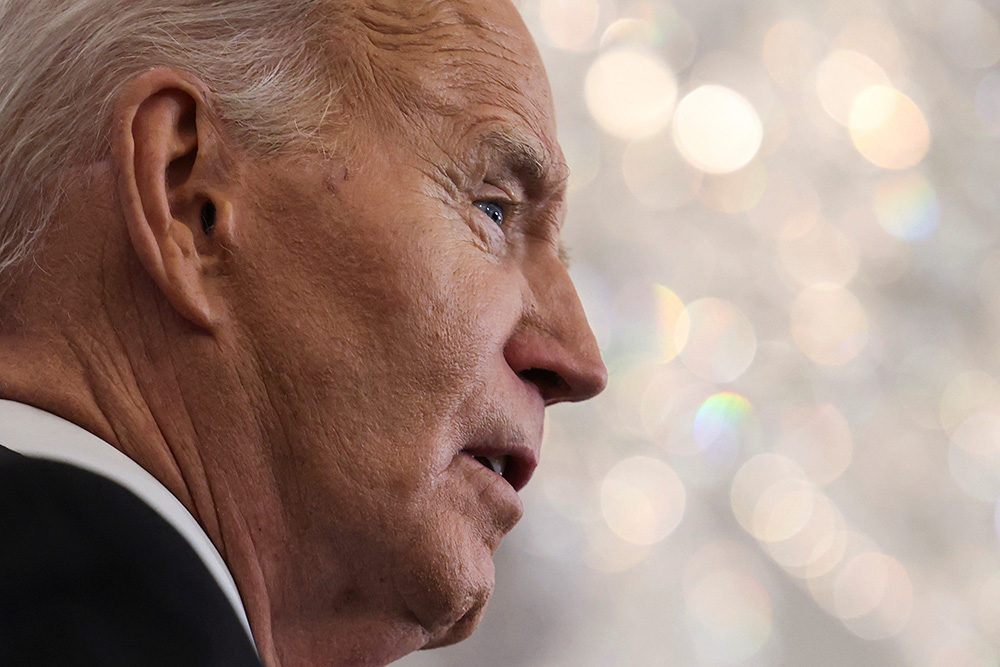
U.S. President Joe Biden delivers a speech at the State Department in Washington, D.C., Jan. 13. (Reuters/Evelyn Hockstein)
President Joseph Biden defended his conduct of foreign policy in a speech at the State Department Monday, Jan. 13. As is the case with so many of his accomplishments, the incoming administration will have it in its power to build on Biden's successes, correct some of his failures, or make a complete hash of all of it.
"The United States is winning the worldwide competition compared to four years ago," Biden said on Jan. 13. "America is stronger. Our alliances are stronger, our adversaries and competitors are weaker. We have not gone to war to make these things happen."
All that is true, or mostly true. Biden is an institutionalist, and, under his leadership, America's alliances have been strengthened. NATO's forceful and sustained aid to Ukraine has allowed that beleaguered nation to keep up the fight against Russian President Vladimir Putin's aggression. My first email on the morning after last November's election was to a Ukrainian friend, expressing solidarity and voicing the concern that there may be no means of keeping a second Donald Trump administration from abandoning the fight.
As we learned in the 1990s in Bosnia, the European Union looks to America to take the lead, or there will be no defense against tyrannical potentates seeking to dominate their neighbors. Then, as now, the United Nations proved a feckless instrument for attaining peace. Only when the U.S. led NATO to conduct airstrikes in 1995 after the massacre at Srebrenica did the negotiations that brought it to an end become possible. Only with U.S. leadership were further humanitarian horrors prevented.
Now, we must hope that Ukraine must not endure an equivalent of Srebrenica to keep the U.S. and its NATO allies in the fight.
Biden remained faithful to America's alliance with Israel, overcoming his personal dislike for Israeli Prime Minister Benjamin Netanyahu and keeping anti-Israeli critics within the Democratic Party at arm's length. If he tried to lean on our Arab allies to come up with a plan to deliver humanitarian assistance to the people in Gaza, or to play a role in achieving postwar stability there, it was not successful.
It is less clear that "our adversaries and competitors are weaker," at least not all of them. China seems increasingly aggressive in its attitude toward Taiwan. The large-scale military exercises the Chinese military conducted in the waters and airspace around Taiwan last October were terrifying. China certainly did not look "weaker."
Advertisement
Iran has certainly been weakened, primarily by Israel's attacks on its clients, Hamas, Hezbollah and the Huthis in Yemen. America's commitment to Israel is built on our shared values but also on our shared interests, and the Israeli military has been steadily, and successfully, diminishing the influence of America's most frightening adversary, Iran.
Russia has been weakened. Putin thought his invasion of Ukraine would be a cake walk but the brave resistance of the Ukrainian people and their military has turned it into a nightmare for the Kremlin. An independent report issued this week said that Russia has sustained the deaths of at least 220,000 soldiers in the war. The Russian economy is struggling, with ordinary Russians forced to suffer while the military sector flourishes. In a democracy, that would not be sustainable, but in an autocracy, if the autocrat decrees the people suffer, suffer they will.
One foreign policy debacle haunted Biden: The evacuation of U.S. forces from Afghanistan. In his address to the nation at the time, Biden commented on the "extraordinary success of this mission." The images of chaos told a different tale.
To be sure, in the history of warfare, evacuations are always among the most dangerous military operations. But the intelligence failure regarding the Taliban, the scenes of chaos at Kabul's airport, the horrors to which Afghan women and girls have been exposed by the resurgent Taliban, all undercut Biden's reputation for competence in foreign affairs.
The evacuation is part of the reason that Biden, for all his successes, failed to convince the American people why it remained important for America to play a leading role in the world. He lacked the rhetorical gifts of his two Democratic predecessors, Bill Clinton and Barack Obama, both of whom were more successful at painting a picture of America's role that most Americans could grasp and adopt. Nor did he sufficiently define and defend the balance of values and interests that must shape American foreign policy.
Blessings upon the leaders who figure out how to free the suffering people of North Korea and South Sudan from the violence that is their daily bread, but we still await such leaders.
We live in uncertain times. In addition to threats of war, the specter of climate change has the potential to upend all efforts at international stability. Biden's decency has served the nation well at home and abroad, but personal character traits only get one so far in politics. You need to win at election time.
Now, control over U.S. foreign policy will be handed to a president who might well undercut our alliances and be charmed by our adversaries. It is a frightening prospect.







